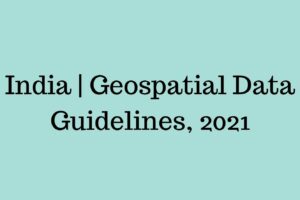On 15th February, 2021, the Department of Science and Technology released Guidelines for acquiring and producing Geospatial Data and Geospatial Data Services including Maps. Geospatial data, which includes location information are data about the natural or man-made, physical or imaginary features whether above the ground or below, boundaries, points of interest, natural phenomena, mobility data, weather patterns, statistical information, etc. There has been immense progress over the years in technology for capture of geospatial data through ground-based survey techniques, photogrammetry using manned/unmanned aerial vehicles, terrestrial vehicle mounted Mobile Mapping System, LIDAR, RADAR Interferometry, satellite-based remote sensing, mobile phone sensors and other techniques.
The Government of India acknowledges that the availability of comprehensive, highly accurate, granular and constantly updated representation of Geospatial Data will significantly benefit diverse sectors of the economy and will significantly boost innovation in the country and greatly enhance the preparedness of the country for emergency response. What is readily available globally does not need to be restricted in India and therefore geospatial data that used to be restricted will now be freely available in India. The key reforms introduced by the guidelines are discussed below:
- Atmanirbhar Bharat: At present, India relies on foreign resources for mapping technologies and services. Liberalisation of the mapping industry and democratization of existing datasets will spur domestic innovation and enable Indian companies to compete in the global mapping ecosystem by leveraging modern geospatial technologies. Locally available and locally relevant Maps and Geospatial Data would also help in improved planning and management of resources and better serve the specific needs of the Indian population. Fisheries, deep sea mining, and offshore oil and gas make up a large section of India’s blue economy, where Geospatial Data is expected to play a potentially important role. The Sabrimala Project and Deep Ocean Mission are notable projects that envisages exploration of minerals, energy and marine diversity of the underwater world, a vast part of which still remains unexplored.
- Unrestricted data: There will be no restrictions on the collection, generation, preparation, dissemination, storage, publication, updating and/or digitization of Geospatial Data and Maps within the territory of India. Individuals, companies, organizations, and Government agencies, shall be free to process the acquired Geospatial Data, build applications and develop solutions in relation to such data and use such data products, applications, solutions, etc. by way of selling, distributing, sharing, swapping, disseminating, publishing, deprecating and destructing.
- Negative List: There shall be a negative list of sensitive attributes that would require regulation before anyone can acquire and/or use such attribute data. DST will notify this list on its website along with stipulated regulations after consultation with departments concerned. DST will constitute a Geospatial Data Promotion and Development Committee with representations from relevant departments that would decide any issue arising out of finalization of negative attributes lists and the regulations proposed on those attributes.
- Threshold Value: On-site spatial accuracy shall be one meter for horizontal or Planimetry and three meters for vertical or Elevation. Gravity anomaly shall be 1 milli-gal. Vertical accuracy of Bathymetric data in Territorial Waters shall be10 meters for up to 500 meters from the shore-line and 100 meters beyond that. For the attributes in the negative list, different threshold values as well as regulations as warranted can be laid down. The thresholds shall be regularly reviewed and amended as necessary by DST.
- Verification: Ground truthing/verification, access to Indian ground stations and augmentation services for real time positioning (Continuously Operating Reference Stations (CORS), etc) and their data shall be made available without any restrictions and with the ease of access to Indian Entities only. Terrestrial Mobile Mapping survey, Street View survey and surveying in Indian territorial waters shall be permitted only for Indian Entities irrespective of accuracy.
- Foreign Entities: Foreign companies and foreign owned or controlled Indian companies can license from Indian Entities digital Maps/Geospatial Data of spatial accuracy/value finer than the threshold value only for the purpose of serving their customers in India.
- Cloud storage: Digital Maps/Geospatial Data of spatial accuracy/value up to the threshold value can be uploaded to the cloud but those with accuracy finer than the threshold value shall only be stored and processed on a domestic cloud or on servers physically located within territory of India.
- Accessibility: All Geospatial Data produced using public funds, except the classified geospatial data collected by security/law enforcement agencies, shall be made easily accessible for scientific, economic and developmental purposes to all Indian Entities and without any restrictions on their use.
*Tanvi Singh, Editorial Assistant put this story together.

